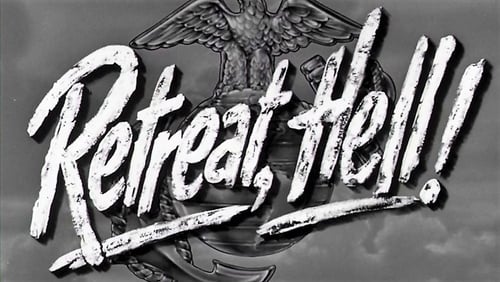Vashirdfel
Simply A Masterpiece
Zlatica
One of the worst ways to make a cult movie is to set out to make a cult movie.
Haven Kaycee
It is encouraging that the film ends so strongly.Otherwise, it wouldn't have been a particularly memorable film
Fleur
Actress is magnificent and exudes a hypnotic screen presence in this affecting drama.
Leofwine_draca
RETREAT, HELL! is a fun and patriotic little Korean War movie with a greater emphasis on characterisation than most B-flicks of the era. Shot in black and white on a low budget with the copious use of (decent) stock footage of the real war, this follows a reluctant captain (played by CREATURE FROM THE BLACK LAGOON's Richard Carlson) as he leads his men against overwhelming numbers of Chinese and North Koreans during that violent escapade. The film's script is snappy and the characters are well drawn, even if only a few of them get our focus: Frank Lovejoy's no-nonsense lieutenant colonel stands out here, as does Russ Tamblyn's ever-so-youthful recruit (and it must have been one of the few times that an actor's age matched that of the character he played). RETREAT, HELL! doesn't have the finest action scenes you'll see, but it doesn't prove to be boring either, and I rather liked it.
dougdoepke
The movie traces Marine combat battalion from training base in California to South Korea's Inchon landing to North Korea's Chosin Reservoir and retreat from there to the coast for naval rescue.Several notable features are in this otherwise fairly routine war film. First, it's surprisingly de-politicized for its sensitive time period. The movie was produced in 1952, at a time when the war in Korea had stalemated and anti-communist fervor (Senator McCarthy) was at a fever pitch stateside. One would expect a lot of talk about red aggression and Chinese hordes. However, there's hardly any explanation in the narrative about where the war is or why it's occurring! Instead, the screenplay focuses almost exclusively on Marine Corps professionalism from officers to NCO's to recruits. Looks to me like the movie's purpose is to restore the Marines' popular image following the Chosin debacle, without getting involved in messy politics. After all, Marine combat in WWII had been one of steady advance across the Pacific; at the same time, footage of retreat in Korea shook American confidence in that murky war.Another notable feature is the low-budget film's effort at recreating the horrendous winter weather that plagued the retreat. I recall newsreels of the time of the steep mountains and freezing snow being almost as scary as the combat itself. I doubt the retreat over those mountain passes would have succeeded without the continuous air support.Notable too is the general absence of sometimes silly small talk that characterizes so many WWII combat films. That's understandable since the war in Korea was never popular and little understood at home, especially after the massive Chinese intervention. On the other hand, there's the kind camaraderie and bonding among the troops that could be expected, but none of the light-hearted victory-is-certain banter of 10-years earlier.As other reviewers note, the combat itself is mostly a series of clichés. However, the acting is good and Tamblyn is perfect for his idealized all-American-boy role. But the movie itself is now largely a curiosity dramatizing as it does one of America's few military retreats.(In passing—in my little book, the war was characterized by two massive blunders—first, North Korea's reckless belief that the US would tolerate a unified communist Korea only a few hundred miles from post-war Japan; and second, Gen. MacArthur's over-confident belief that China would somehow allow an American army on China's border {the Yalu river}. The result of these blunders was 3-years of war, thousands of dead, and most ironically, a return afterward to the same divided country {38th Parallel} as before the devastation!)
RanchoTuVu
The Korean War doesn't have the glory that goes with WW2, although there are a few films about that war that have helped shape an image of bitter fighting carried out in even more bitter weather conditions. Retreat, Hell! should be right up there with Pork Chop Hill as the definitive Hollywood depiction of that conflict. It has that deft mix of grim authenticity, of action, and of fine characterizations. It has to be one of Russ Tamblyn's best dramatic parts. A lot of well interspersed and well done action scenes of fighting in barren snow swept hilltops and ravines, with the finale being a furious Chinese charge right into the colonel's tent. In black and white, this film has a pervasive grimness to it, that contrasts with the story of a unit of Marines trying to keep up a sunny and positive spin on a desperate situation. It's a flag-waver, but exceedingly well done.
Henry Willis
The local Fox channel in Los Angeles must have harbored a cell of fans of Retreat, Hell!, because it seemed as if they showed this film at least once a month in the hours between 2 and 5 a.m. I was hooked after one viewing, although I know I came in somewhere in the middle; it was some time before my erratic sleep patterns fell into synch with the program schedule. I can't recommend it too highly--it is a tribute to all cliches of all war movies to that date, without the distraction created by interesting characters, plot or technical skill. Watch it again and again and you'll understand.



